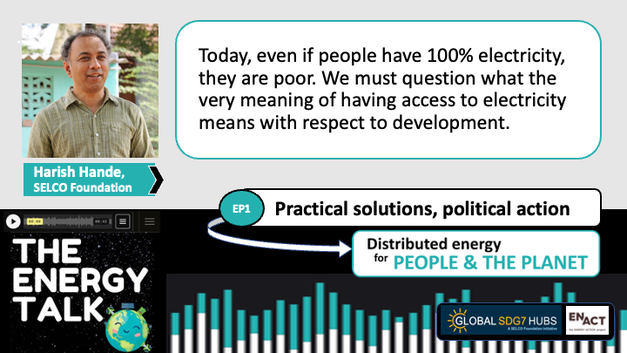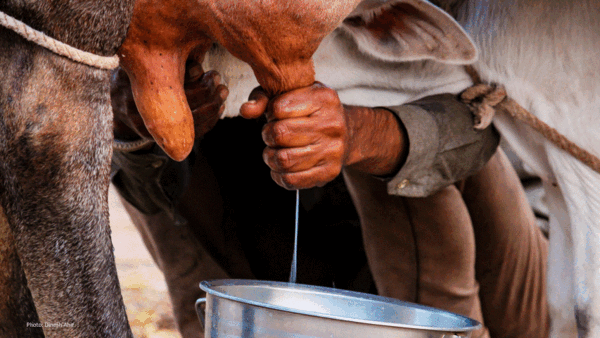Distributed Renewables for Livelihoods in the Global South
To truly transform lives in the Global South, distributed renewable energy (DRE) solutions must seek to understand the potential demand and how supply can best meet it. This has been the mantra of the SELCO Foundation (India) for decades and has driven their work in developing super-efficient technologies that improve productivity for the poorest people in the world. Already, these remote and marginalised communities are having to cope with impacts of climate change that are unfelt by those with easy access to affordable energy.
Practical Solutions, Policy Action is the title of the first episode of a series of podcasts, Distributed Energy for People and the Planet. Host Marilyn Smith of The Energy Action Project (EnAct) speaks with SELCO Foundation founder Harish Hande and Gauri Singh, Deputy Director of the International Renewable Energy Agency (IRENA) about the why small-scale innovation needs high-level policy support.
Hande describes a range of devices that exponentially improve productivity or reduce drudgery for people who eke out a living on small plots of land or in their homes or small shops. A solar-powered roti-rolling machine means a woman selling roti to local restaurants can boost daily output from 250 to 1000. Or, supply the same number in a fraction of the time, empowering her to carry out other tasks or pursue other aspirations.
Simple technologies could lift millions out of poverty
Considering the billions of small-hold farmers in the Global South whose incomes are constrained by the need to quickly sell whatever crops or produce they can harvest, SELCO Foundation looked for opportunity across the agriculture supply chain. With small-scale solar installations, farmers can collectively benefit from technologies such as seed sorters, hydroponic irrigation and threshing machines. Or, they can grow greens at home, rather than walking miles to graze cattle. Aside from boosting productivity, these technologies mean farmers can bring higher value products into the market, thereby earning more and having more bargaining power. In fact, these approaches can support local economies, reducing everyone's need to rely on big players.
Decades of hard manual labour and increased exposure to extreme weather have serious health impacts for these communities. However, as most nearby health clinics lack reliable electricity, the level of services is low and it can be difficult to recruit skilled staff. Right-sizing a roof-top solar system can ensure electricity for keeping the lights on, operating equipment, refrigerating medicines and cooling facilities.
Policy critical to wide-scale deployment
Once technologies are proven, Singh champions a massive 'policy push' to shift responsibility to governments to roll-out large-scale programmes. After a successful pilot, the Government of India is now on a mission to electrify and equip 25 000 public health clinics (PHCs) by the end of 2025. In her current role, she can bring this model to governments around the World.
A clean energy transition must be just
At COP28, governments and multinational corporations agreed on 'phasing out fossil fuels' as critical to the clean energy transition. Demonstrating how quickly strategic deployment of DREs and efficient equipment can disrupt outdated concepts of energy supply and demand is vital to delivering both energy and climate justice...finally. Together with the United Arab Emirates, IRENA and SELCO Foundation have launched a new fund to support this steam of innovation and uptake.
This podcast series was co-produced by the Global SDG7 Hubs, The Energy Action Project and The Energy Talk.





















